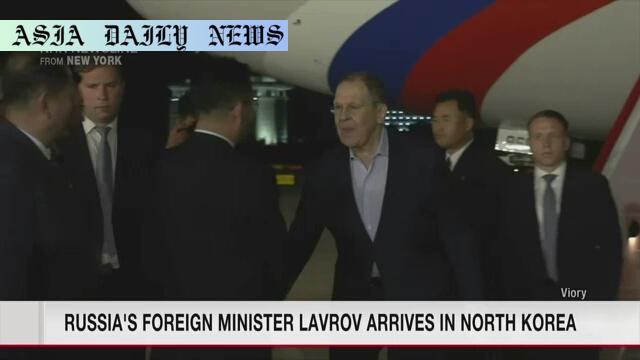Russia-North Korea Relations deepen as Lavrov plans Kim’s visit to Moscow and discusses Pyongyang’s support for Ukraine conflict.
Key Point 1: Lavrov visits North Korea to discuss strategic ties and deliver a letter from Putin to Kim Jong Un.
Key Point 2: Talks include Kim’s potential visit to Russia and Pyongyang’s support for Moscow’s Ukraine invasion.
Key Point 3: Russia condemns growing US alliances with South Korea and Japan as provocative.
Key Point 4: Highlights increasing military collaboration under a strategic partnership signed in June 2022.
Key Point 5: Both nations aim to counterbalance US influence and foster military and economic cooperation.

Introduction: Rising Cooperation Between Russia and North Korea
Russia and North Korea are navigating a crucial phase in their bilateral relationship, marked by increased cooperation in political, economic, and military spheres. Foreign Minister Sergey Lavrov’s recent visit to North Korea underscores this growing alignment, as both nations confront geopolitical challenges and seek to counterbalance perceived US influence in the region. This visit not only strengthens Russia-North Korea ties but also sheds light on broader global dynamics.
Lavrov’s Visit: Strengthening Diplomatic and Military Collaboration
Foreign Minister Sergey Lavrov arrived in North Korea’s coastal city of Wonsan to initiate high-level talks with his North Korean counterpart Choe Son Hui and potentially meet with Supreme Leader Kim Jong Un. This diplomatic endeavor centers around pivotal issues, including Kim’s planned visit to Russia and Pyongyang’s growing support for Moscow in the Ukraine conflict. Lavrov is also expected to personally deliver a letter from Russian President Vladimir Putin to Kim, symbolizing the importance of this bilateral engagement. The visit takes place against the backdrop of their Comprehensive Strategic Partnership agreement, signed in June last year, which has significantly deepened military collaboration between the two nations.
Strategic Importance of Pyongyang’s Support in the Ukraine Conflict
One of the key points on the agenda is the potential expansion of North Korea’s support for Russia’s military operations in Ukraine. Pyongyang’s involvement becomes crucial for Moscow, as international sanctions and Western military aid to Ukraine continue to strain Russia’s resources. The strategic cooperation extends beyond military alignment, as North Korea positions itself as a reliable partner for Russia in a time of growing diplomatic and economic isolation from the West. Lavrov’s visit reaffirms their intent to foster stronger ties in light of mutual geopolitical interests.
Geopolitical Context: Countering Western Alliances
The visit also highlights a shared concern over the increasing influence of the United States in the Asia-Pacific region. Lavrov criticized the US for strengthening its military and political alliances with South Korea and Japan, describing these actions as provocations. This sentiment resonates with North Korea, which views the US as a persistent adversary. Through their partnership, Russia and North Korea aim to counterbalance these developments, emphasizing military cooperation and mutual support in global forums.
Beyond Diplomacy: Potential Economic and Tourism Ventures
In addition to political and military discourse, Lavrov’s visit included discussions on economic collaboration and tourism initiatives. North Korea is reportedly interested in drawing Russian tourists to newly developed coastal resorts, such as those in Wonsan. Such efforts demonstrate Pyongyang’s commitment to diversifying its economy and fostering closer ties with Moscow. For Russia, these ventures represent a chance to cultivate long-term goodwill and cooperation with North Korea beyond defense and diplomacy.
Conclusion: A Deepening Alliance Amid Global Tensions
The evolving relationship between Russia and North Korea sheds light on shifting alliances in the wake of complex geopolitical realities. Both nations, facing sanctions and diplomatic resistance from the West, have found common ground in their efforts to challenge US-led narratives and actions. Lavrov’s visit highlights the deepening of these ties, laying the groundwork for future collaboration in military, political, and economic domains. As this partnership grows stronger, it is bound to influence global developments in ways that could reshape the current world order.
Commentary
The Strategic Implications of the Russia-North Korea Alliance
Russia’s shifting focus toward North Korea is a significant development that demands further attention. Sergey Lavrov’s visit exemplifies Moscow’s growing reliance on Pyongyang, especially at a time when diplomatic relations with Western nations remain fraught. North Korea, grappling with its own isolation, appears eager to seize this opportunity to solidify itself as a crucial ally to Russia. Both nations see their partnership as a strategic necessity, and it is essential to understand the long-term implications of their alliance.
The most striking aspect of this partnership is its overt military collaboration. From strategic agreements signed last year to current discussions of mutual support in conflicts such as the Ukraine war, this military alignment signals a challenge to the current global power structure. Moreover, it underscores how nations under sanctions often form unlikely alliances to combat shared adversities. For the United States and its allies, this poses an existential challenge that may require a recalibration of their diplomatic and military strategies in the Asia-Pacific region.
A Shift in the Balance of Power?
What makes this alliance particularly noteworthy is its broader geopolitical implications. By aligning with North Korea, Russia not only consolidates its position in Asia but also signals to its Western adversaries that it is unafraid to pursue unconventional alliances. Additionally, economic ventures such as tourism initiatives indicate that their relationship is not limited to defense but extends to building robust economic ties. This diversification of their partnership could lead to more sustained and meaningful cooperation over time.
Final Thoughts
As global tensions continue to escalate, the Russia-North Korea partnership might become more pivotal in shaping international politics. Both nations, under pressure from Western powers, have found in each other a valuable ally to counterbalance the growing influence of the United States and its regional allies like Japan and South Korea. While this strategic alliance has obvious benefits for both sides, it also raises questions about the future of global diplomacy and multi-polarity in world affairs. Time will reveal the full impact of this deepening partnership.


